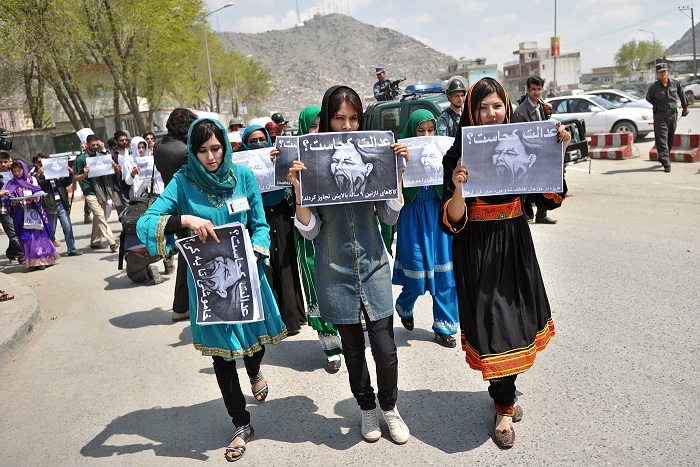
Afghan Young Women for Change (YWC) activists, holding placards which read "where is justice?", take part in a protest denouncing violence against women in Afghanistan in Kabul on April 14, 2012.
President Obama made an announced visit to Afghanistan on May 1 to sign an agreement intended to lead to a pullback of US troops from Afghanistan by 2014. The document is very specific on issues around the arrangements related to security and interestingly, trade and commerce but inadequate when talk to turns to human rights in general and specifically women’s rights.
Amnesty will continue to urge the US government to implement an action plan to protect and promote women’s rights in Afghanistan as they pull back from the country.
Women in Afghanistan, however, aren’t waiting around for vague assurances by the US and Afghan governments. They are taking matters into their own hands and demanding justice for the victims of past human rights violations and the promotion of human rights for all in their country.
Young Women for Change led a demonstration protesting against injustice and calling out the Afghan government for its failure to prosecute human rights violations committed against women and girls. They noted:
“Since Nawroz, New Year, at least five women have been killed in Afghanistan. Three women were killed in Herat, one of whom was beheaded by her husband. Another woman was killed by her husband in Khost and another was hanged after the unjust decision of the tribal court in Paktya”
But now, even the rights of the women to protest the injustices of the government are under threat. They are under threat from a Taleban movement that espouses and extreme ideology that stands against women’s rights.
But the threat to women and girls are also from an Afghan government that has shown a worrying pattern of pandering to Taleban ideology at the expense of human rights and a US government that seems more interested in declaring victory on the “war on terror” than in securing human rights gains promised by the Bush and Obama administrations.
The Obama – Karzai agreement doesn’t come close to what Afghan women are demanding. The agreement also doesn’t come close to what US Secretary of State, Hilary Clinton said in 2010 to female Afghan officials:
We will not abandon you, we will stand with you always … [it is] essential that women’s rights and women’s opportunities are not sacrificed or trampled on in the reconciliation process.
This is why the US must implement an action plan to ensure that the US and its allies carry out promises made to the women of Afghanistan. And we need your help to demand that Afghan women’s rights are non-negotiable.
Afghan-istan? Full of hounds…chock full:-P
I strongly support women's rights. I condemn those social, cultural, political, or religious movements that oppress women. But I don't fully understand what is being requested here. I read the steps in the "action plan" but don't know exactly what leverage AI is asking the U.S. to apply.
Should American troops stay in Afghanistan until women achieve human rights?
Should American troops get out of Afghanistan if no one will agree to women's rights?
Should the U.S. stop supporting the Afghan government if it will not agree to the steps?
Should the U.S. refuse to negotiate with the Taliban if it will not agree to the steps?
Should the U.S. apply the same pressures to Saudi Arabia, Israel, or other countries where women's rights have sometimes been denied?
What should the U.S. do if the Karzai administration and the Taliban say that this plan is an interference in their internal affairs? What should they do if the Afghans just say "No!" – as they surely will.
These are practical questions that U.S. policy makers have to answer before they can even try to do anything about women's rights. If they have no answers to these questions, they can't "push" for anything. They won't even know what "pushing" means. You have offered no help with these questions, and I can't imagine what help you could give.
Personally, I don't know what should be done. I have ideas about how to support women's rights in the U.S., but I don't have any idea about what will work in Afghanistan, or whether an outside country like the U.S. can have any positive effect. I'm not even sure that pressure from the U.S. won't have an opposite effect to what we hope to achieve.
Part of the problem in Afghanistan is our own fault in that multiple previous American administrations supported Islamic fundamentalism. Personally, I think we've already done enough damage to the Afghans and to ourselves. I think we should get out on the best terms we can get. And if those terms aren't very good, I think we should still get out.
I strongly support women's rights. I condemn those social, cultural, political, or religious movements that oppress women. But I don't fully understand what is being requested here. I read the steps in the "action plan" but don't know exactly what leverage AI is asking the U.S. to apply.